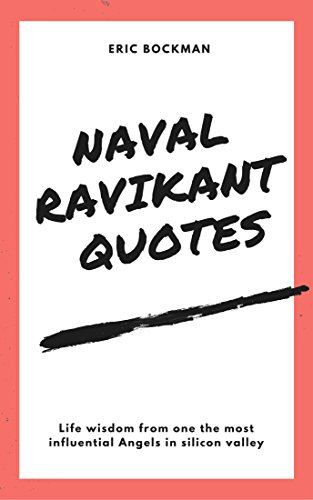Naval Ravikant was recently on the Joe Rogan podcast, and it is one of the best podcasts I’ve ever heard. I didn’t know about Ravikant prior to seeing this podcast, which I’m a little surprised about since he is in the same circle of people I normally follow online. If you don’t know who Ravikant is, he is the founder of AngelList, which according to Wikipedia “is a U.S. website for startups, angel investors, and job-seekers looking to work at startups”.
Ravikant has his own podcast at The Angel Philosopher. You have to scroll past his twitter feeds and other social media links to get to his podcast clips at the bottom of the page. There are a series of short audio clips that according to him are intended to be “information dense” without rehashing details that have already been explored by others. I found this link to a nice set of YouTube video podcasts with Naval: Podcast – Naval.
My main interest in life is the quest for self-development, so I’m drawn towards people like Naval Ravikant. His unique perspective on what it means to be human, what it means to continuously strive and grow resonates deeply with me. One area I’ve struggled in has been a desire to explore many different fields of interest. I may get interested in an activity for a while, learn about it, enjoy it, then lose interest and move onto something different. This process, while rewarding, has not lead to much in regards to creating any long lasting gains in the things I explore. I’ve often wondered if I fall victim to the Dabbler’s Dilemma, but on the other hand this meandering through life feels like it’s leading towards something more cohesive. It’s as if learning a wide variety of things is possibly leading toward a more singular focus that can be achieved through this exploration.
In this podcast Ravikant talks about this a little. His contention is that the ability to re-invent yourself is what leads people to do great things. He uses artists as examples, bands that achieve success with an album, then totally re-invent their sound for the next album. Some of this experimentation is successful, some leads to failure, but it all leads to progress.
Some other interesting take-ways from the podcast:
- Ravikant would rather read 100 great books over and over, to better absorb the information, rather than read many books. I can relate to this. I’ve been guilty in the past of curating books, but I found that though I immensely enjoy reading a wide variety of books, the information doesn’t stick with me. I tend these days to re-read a few books in an attempt to really internalize what they have to teach.
- He’ll read a book partially, gain the understanding he needs from it and move on to something else. I always feel like I have to stick with a book from beginning to end, but I’m going to try his method. I like reading for “reading’s sake”, but I like his approach of reading “to get the knowledge you’re looking for”. It’s a different focus.
- Most people want to be wealthy, fit and happy. He thinks these things can be taught. To learn to be happy he thinks you can adopt a “happiness” mindset, and develop a social contract that defines you as a happy person. His belief is that social contracts are strong enough to force you to accomplish what you set out to do. If you want to be an entrepreneur, then tell everyone you’re going to do it so the pressure is on. If you want to be a happy person, present yourself as a happy person until people expect that from you, thus leading to that expectation within yourself.
- You should strive to be the most calm person in a crisis, and still be able to solve the problem at hand.
- “Desire is a contract you make with yourself to be unhappy until you get what you want”.
- “We live in an age of infinite leverage” – we have the ability to reach people at a large scale thanks to the internet. So we can make decisions that can impact ourselves and many other people. In order to make responsible decisions with this leverage “you have to learn how to tame your mind like you have to tame your body”.
- “You’re not going to get rich renting your time” – You need a piece of a business or build a brand that accrues back to you. Be OK with re-inventing yourself until you find the unique set of specialized knowledge that you bring to the table that adds value. This will be your easiest path to wealth once you figure it out.
- He says that society has mostly been made of people that work by themselves, but the industrial age introduced the model of lots of people working together on one thing. He thinks the information age will reverse this. I agree.
Worth checking out is Ravikant’s tweetstorm on “how to get rich without being lucky”, as well as this blog post which takes a deeper dive into that tweetstorm. Among the topics discussed are the importance of developing specific knowledge, computer code and media are behind the newly rich, become the best in the world at what you do, keep redefining until this is true, and take business risks under your own name. This last point rings especially true to me, and is a big reason why I started blogging. I had tried other business ventures in the past, but never felt true ownership over them. Now that I’m blogging and writing and putting myself out there as “myself” I have much more buy-in personally into my ventures. Interestingly I am also achieving more success this way.







Comments by The Dapper Savage